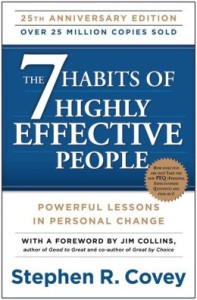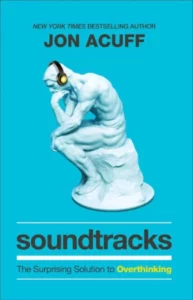This is the book Dr. Stephen R. Covey is best known for. It’s one of the best books on self-leadership ever. You should have a copy in your library. (Amazon agrees—it’s included with Kindle Unlimited.)
Obviously, the seven habits are the meat and potatoes of the book. The first three habits are personal; they cover how you should handle yourself, and they’re largely focused on planning and being intentional with your life. The next three habits are interpersonal—how you interact with other people. The seventh habit is a keystone habit that will make sure you never stop growing.
The habits are:
- Be proactive. You are responsible for what happens in your life. You have the power and responsibility to make choices and steer your ship instead of blaming the current for where you end up.
- Begin with the end in mind. All things are created twice—first mentally, then physically. You can imagine a better outcome than what you currently see and be proactive to make that outcome happen.
- Put first things first. If you want to make that better outcome happen, you have to identify your priorities, place the important above the merely urgent, and let go of things that just don’t matter.
- Think win-win. See life as a collaboration, not a competition. The best way to get what you want is to help other people get what they want. Any other arrangement is unsustainable.
- Seek first to understand, then to be understood. Listen. Understand the other person’s position so well you can articulate it better than they can. Then you can build a framework for open and honest communication that will lead and influence through mutual respect instead of whoever can shout loudest.
- Synergize. It’s a buzzword that’s gotten a bad rap, but it’s powerful. The whole really can (and should) be greater than the sum of its parts. It’s okay to be different, because that’s what lets synergy happen.
- Sharpen the saw. There are four key aspects of your life: physical, mental, social/emotional, and spiritual. You have to take care of yourself in all areas in order to maintain and grow your effectiveness.
Some of the most applicable tools I got from 7 Habits are some of the supporting concepts that Covey uses to unpack the Habits. Things like the Eisenhower Productivity Matrix, the abundance mentality, the importance of a personal mission statement, the power of unconditional love, the impact our self-talk can have, the circles of influence and concern, and visualizing the speakers at your own funeral (or 80th birthday party, if you prefer).
You can always read a book, put it on the shelf, and not be any different for having read it. If you will study 7 Habits and re-read the book—however many times it takes for things to start sinking in—it will transform your life. It will change the way you approach problems. It will change the way you think. It will permeate everything else you do to improve yourself, and you will improve faster.


